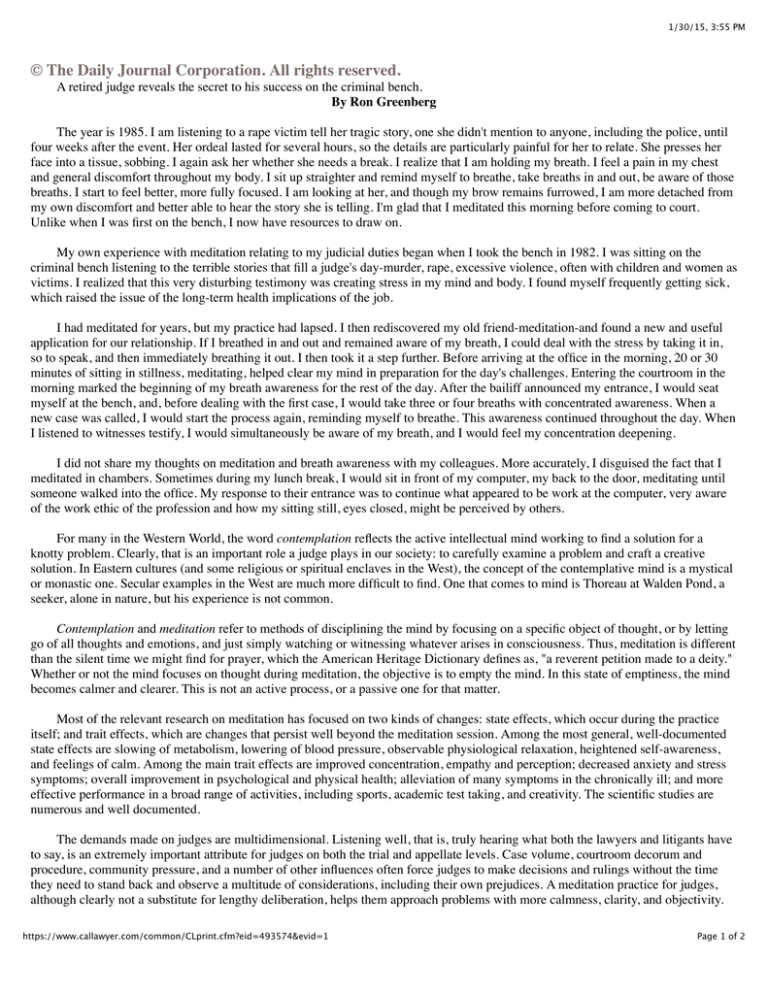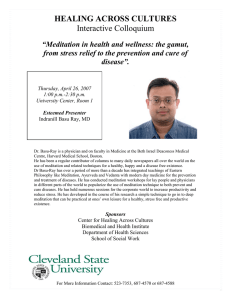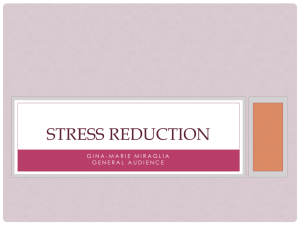
1/30/15, 3:55 PM
© The Daily Journal Corporation. All rights reserved.
A retired judge reveals the secret to his success on the criminal bench.
By Ron Greenberg
The year is 1985. I am listening to a rape victim tell her tragic story, one she didn't mention to anyone, including the police, until
four weeks after the event. Her ordeal lasted for several hours, so the details are particularly painful for her to relate. She presses her
face into a tissue, sobbing. I again ask her whether she needs a break. I realize that I am holding my breath. I feel a pain in my chest
and general discomfort throughout my body. I sit up straighter and remind myself to breathe, take breaths in and out, be aware of those
breaths. I start to feel better, more fully focused. I am looking at her, and though my brow remains furrowed, I am more detached from
my own discomfort and better able to hear the story she is telling. I'm glad that I meditated this morning before coming to court.
Unlike when I was first on the bench, I now have resources to draw on.
My own experience with meditation relating to my judicial duties began when I took the bench in 1982. I was sitting on the
criminal bench listening to the terrible stories that fill a judge's day-murder, rape, excessive violence, often with children and women as
victims. I realized that this very disturbing testimony was creating stress in my mind and body. I found myself frequently getting sick,
which raised the issue of the long-term health implications of the job.
I had meditated for years, but my practice had lapsed. I then rediscovered my old friend-meditation-and found a new and useful
application for our relationship. If I breathed in and out and remained aware of my breath, I could deal with the stress by taking it in,
so to speak, and then immediately breathing it out. I then took it a step further. Before arriving at the office in the morning, 20 or 30
minutes of sitting in stillness, meditating, helped clear my mind in preparation for the day's challenges. Entering the courtroom in the
morning marked the beginning of my breath awareness for the rest of the day. After the bailiff announced my entrance, I would seat
myself at the bench, and, before dealing with the first case, I would take three or four breaths with concentrated awareness. When a
new case was called, I would start the process again, reminding myself to breathe. This awareness continued throughout the day. When
I listened to witnesses testify, I would simultaneously be aware of my breath, and I would feel my concentration deepening.
I did not share my thoughts on meditation and breath awareness with my colleagues. More accurately, I disguised the fact that I
meditated in chambers. Sometimes during my lunch break, I would sit in front of my computer, my back to the door, meditating until
someone walked into the office. My response to their entrance was to continue what appeared to be work at the computer, very aware
of the work ethic of the profession and how my sitting still, eyes closed, might be perceived by others.
For many in the Western World, the word contemplation reflects the active intellectual mind working to find a solution for a
knotty problem. Clearly, that is an important role a judge plays in our society: to carefully examine a problem and craft a creative
solution. In Eastern cultures (and some religious or spiritual enclaves in the West), the concept of the contemplative mind is a mystical
or monastic one. Secular examples in the West are much more difficult to find. One that comes to mind is Thoreau at Walden Pond, a
seeker, alone in nature, but his experience is not common.
Contemplation and meditation refer to methods of disciplining the mind by focusing on a specific object of thought, or by letting
go of all thoughts and emotions, and just simply watching or witnessing whatever arises in consciousness. Thus, meditation is different
than the silent time we might find for prayer, which the American Heritage Dictionary defines as, "a reverent petition made to a deity."
Whether or not the mind focuses on thought during meditation, the objective is to empty the mind. In this state of emptiness, the mind
becomes calmer and clearer. This is not an active process, or a passive one for that matter.
Most of the relevant research on meditation has focused on two kinds of changes: state effects, which occur during the practice
itself; and trait effects, which are changes that persist well beyond the meditation session. Among the most general, well-documented
state effects are slowing of metabolism, lowering of blood pressure, observable physiological relaxation, heightened self-awareness,
and feelings of calm. Among the main trait effects are improved concentration, empathy and perception; decreased anxiety and stress
symptoms; overall improvement in psychological and physical health; alleviation of many symptoms in the chronically ill; and more
effective performance in a broad range of activities, including sports, academic test taking, and creativity. The scientific studies are
numerous and well documented.
The demands made on judges are multidimensional. Listening well, that is, truly hearing what both the lawyers and litigants have
to say, is an extremely important attribute for judges on both the trial and appellate levels. Case volume, courtroom decorum and
procedure, community pressure, and a number of other influences often force judges to make decisions and rulings without the time
they need to stand back and observe a multitude of considerations, including their own prejudices. A meditation practice for judges,
although clearly not a substitute for lengthy deliberation, helps them approach problems with more calmness, clarity, and objectivity.
https://www.callawyer.com/common/CLprint.cfm?eid=493574&evid=1
Page 1 of 2
1/30/15, 3:55 PM
And considering the complex questions involved in many cases, a contemplative practice encourages more reflection and less reaction,
helping judges discover the deep and obscure layers in the difficult problems before them and guiding them to find more just solutions.
To obtain tangible results, a daily meditation practice requires dedication, but it also calls for a leap of faith. That concept is
perhaps best illustrated by analogy. Think of the instructions we judges give in every case regarding direct and circumstantial
evidence. Jurors are told that both types of evidence are to be given equal weight. There is a logical explanation. With circumstantial
evidence, to conclude that a fact has been proven, one must find that all the circumstances leading to that conclusion have met the
required burden of proof. But unlike direct evidence, no witness or piece of tangible evidence directly proves the existence of the
particular fact. For example, in an unobserved murder, evidence of a gun with the defendant's fingerprints on it requires the jurors to
make a leap and conclude that the defendant committed the murder. No witness told them that he saw the defendant fire the gun.
The two types of evidence are like the conscious and unconscious minds. The conscious mind directly experiences or observes;
the unconscious mind takes a more indirect approach. Nevertheless, we know that they can be equally important in affecting the
decisions we make in life. In a like manner, the benefits of a daily meditation practice may be difficult to quantify, yet, for those of us
who have practiced for an extended period of time, we know that it profoundly affects our basic temperament as well as the decisions
we make.
There is no formula for developing a meditation practice. Each individual is informed by his or her own personal experiences.
Teachers and meditation programs can assist in the process and be extremely valuable. But the shape one's practice takes will have to
mesh with each individual's life and terrain-social, professional, institutional, generational, ethnic, and cultural.
Meditation is an ancient practice. It has been proven useful in countless arenas. In my experience as a judge, meditation was an
extremely helpful tool, facilitating positive results that were both tangible as well as subtle. I'm sure that many other judges have
discovered the benefits of meditation. Yet in talking with lawyers, judges, and other professionals, I've discovered that some have been
reluctant to share their meditation experiences with colleagues.
Recently, at a seminar at Harvard University, I heard the managing partner of a large and prominent Boston law firm talk about
meditation and how it has helped him and his firm. Each morning 40 lawyers, associates, and partners gather to meditate before
starting the workday. He said that it has been life-changing for him. He explained that he moves through the day very differently,
depending on whether or not he has meditated. It affects his general disposition, how he interacts with others, his level of patience,
how he reacts to the unexpected and, most important, his judgment. He said that he couldn't imagine ever stopping his daily meditation
practice.
As the Harvard seminar moved through the afternoon, I sensed increasing excitement and enthusiasm-faculty members and
students engaged in lively discussion, asking lots of questions. A meditation teacher then initiated a guided meditation. As participants
sat up straight and closed their eyes, I kept mine open to survey the audience. I spotted a couple of retired professors I know, quite
surprised to see them at this gathering. Watching them meditate, I saw intensity in their faces as they embarked on this new adventure.
I then closed my eyes.
Ron Greenberg, retired from the Alameda Superior Court after 18 years on the bench, now works as a mediator. He is writing a
novel about judges, truth, and justice. For a complete survey of empirical research into the effects of meditation, see The Physical and
Psychological Effects of Meditation: A Review of Contemporary Research with a Comprehensive Bibliography: 1931-1996 by Michael
Murphy and Steven Donovan (Institute of Noetic Sciences, 1997). The Center for Contemplative Mind in Society, located at
www.contemplativemind.org, works with lawyers interested in meditation.
https://www.callawyer.com/common/CLprint.cfm?eid=493574&evid=1
Page 2 of 2



